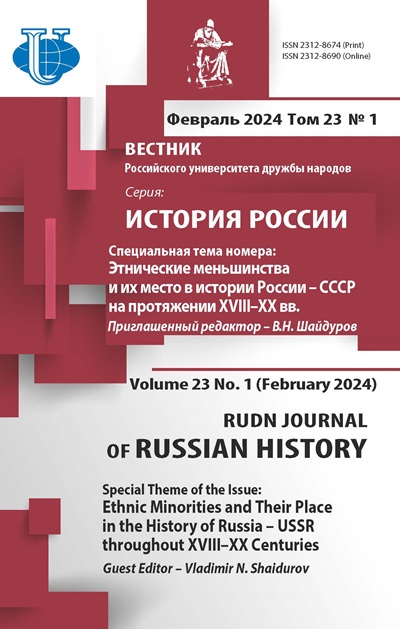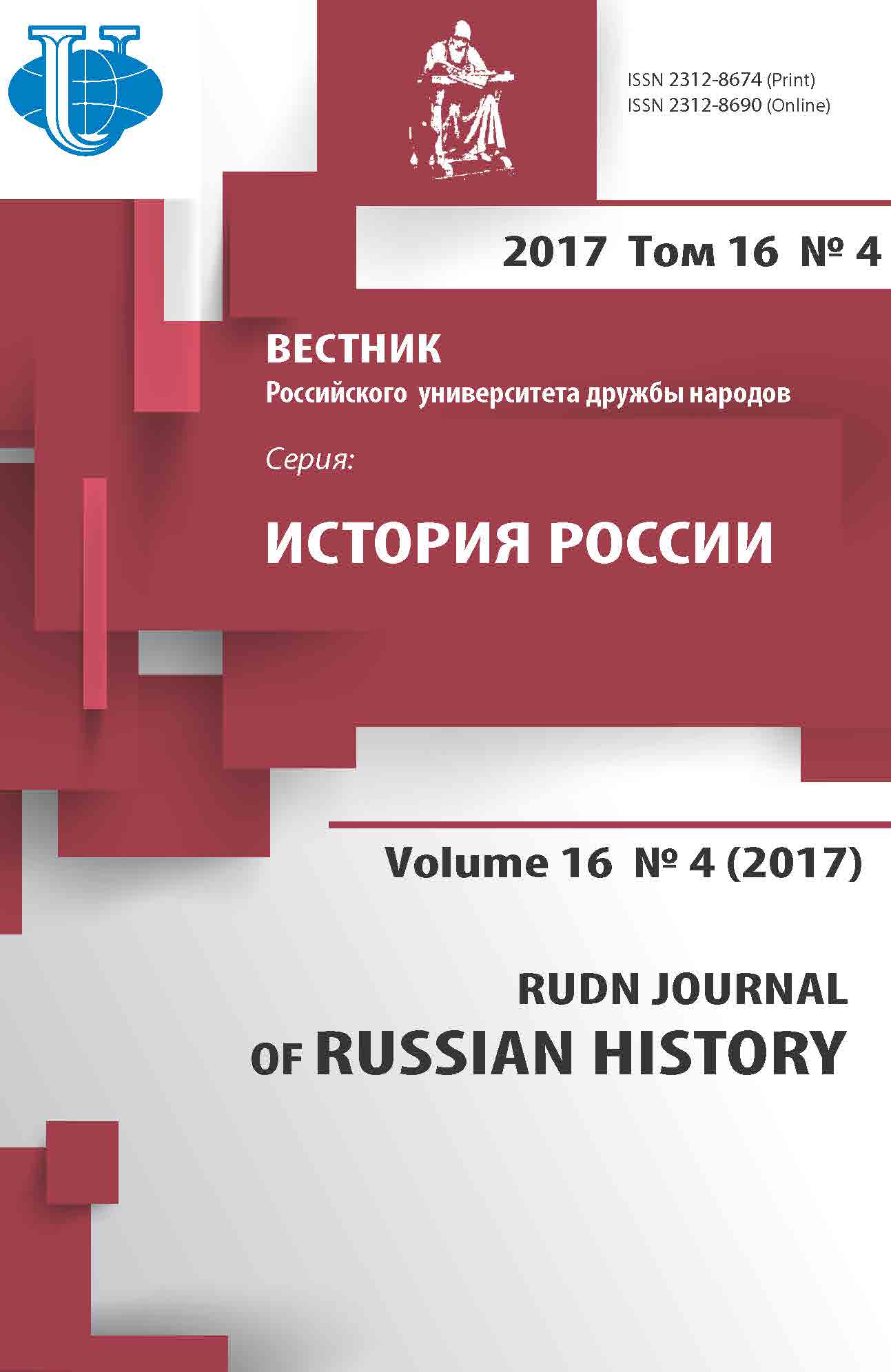LIFE EXPERIENCE OF A DANISH WOMAN IN THE USSR IN THE CONTEXT OF SOVIET-DANISH RELATIONS OF THE 1920-1950S
- Authors: Davidovich I.F1
-
Affiliations:
- Indepandant researcher
- Issue: Vol 16, No 4 (2017)
- Pages: 617-640
- Section: FOREIGNERS IN RUSSIA
- URL: https://journals.rudn.ru/russian-history/article/view/17462
- DOI: https://doi.org/10.22363/2312-8674-2017-16-4-617-640
Cite item
Full text / tables, figures
Abstract
This article deals with the transformation of a Danish woman’s perception of the Soviet life through the prism of her personal life experience. The study is based on the analysis of Sigrid Ulrikka Alma Aagaard’s letters addressed to her mother and younger sister from the Soviet Union, the memoirs of her sons and closest associates. All these materials were stored in the author’s personal archive and published for the fi rst time. The study reveals a close connection of the woman’s personal life with foreign political events, changes in the Soviet-Danish relations that directly infl uenced her fate and worldview. Particular attention is paid to the gradual alienation of the woman from her roots, the need to get used to the new reality and master the rules of the game dictated by the Soviet reality. Having understood the work of the Soviet system, she tried to comply fully with all its requirements. She turned from an idealist into a submissive performer of the will of the state. She was aware that she was always under surveillance, “hooked”, and at any time she could be put before a moral choice. Sigrid ceased to be a Dane, she no longer belonged to the world in which she had been born and grown up. What she had learned in thirty years of her life outside her homeland forever alienated her from her compatriots. At the same time, she found faithful friends in the Mordovian camp TEMLAG, where she was from 1937 to 1946, among the wives of appointees, who, like her, went through hardships, arrests and imprisonment.
About the authors
Inna F Davidovich
Indepandant researcher
Author for correspondence.
Email: innrid@gmail.com
Inna F. Davidovich, Master of Philology, Alumna of the Philological Faculty, the Division of the Russian Language and Literature, the Department of Russian Literature of the 20 th century at Lomonosov Moscow State University (Moscow, Russia).
References
- Pushkareva NL. Ustnaya istoriya i gendernaya istoriya: sblizhenie i perspektivy razvitiya [Oral history and gender history: approchement and development prospects]. Obshchestvennye nauki i sovremennost’ 2012; (1): 168–176 (in Russian).
- Lidegaard Bo. A short history of Denmark in the 20 century. Nordisk Forlag A/S, Copenhagen: Gyldendal; 2009.
- Belkovets LV. Pervye shagi sovetskoi diplomatii (iz istorii rossiiskogo zakonodatel’stva o diplomaticheskom prave) [The fi rst steps of Soviet diplomacy (from the history of Russian legislation on diplomatic law)]. Available at: www.nbpublish.com/library_read_article. php?id=17122 (in Russian).
- Sats NI. Zhizn’ − yavlenie polosatoe [Life is a striped phenomenon]. Moscow: Novosti Publ.; 1991 (in Russian).
- Nedovesova VG. Zapiski vracha [Doctor’s notes]. Avalable at: www.sakharov-center.ru/ asfcd/auth/?t=page&num=3954 (in Russian).
- Kim YuCh, Kim ACh. O nashei mame Nine Vsesvyatskoi – uchitel’nitse: ocherki, vospominaniya, materialy iz domashnego arkhiva [About our mother Nina Vsevlyatskaya − teacher: essays, memoirs, materials from the home archive]. Moscow: Zven’ya Publ.; 2007 (in Russian).
- Vasil’eva E. Lager’ kak predstavlenie. Teatral’naya tema v tyuremnom narrative u Dostoevskogo i Dovlatova [The camp is like a performance. Theatrical theme in the prison narrative of Dostoevsky and Dovlatov]. Available at: http://www.nlobooks.ru/node/6317 (in Russian).
- Smilga TI. Au, Nachal’nik [Au, Chief]. Novye izvestiya [New tidings]. 28 December 2001 (in Russian).
- Vail’ B. Ob odnom zabytom epizode voiny na Baltike. Datskii istorik o sovetskoi okkupatsii Bornkhol’ma [About one forgotten episode of the war in the Baltic. Danish historian on the Soviet occupation of Bornholm]. Zvezda [Star]. 1999; (8). Available at: magazines. russ.ru/zvezda/1999/8/vail.html (in Russian).
- Chapskii K. Krasnoi armii oplot [The Red Army’s mainstay]. Vesti: Ezhenedel’noe prilozhenie “Okna” [News: Weekly application “Windows”]. 27 Novamber 2008 (in Russian).
- Morozov N. Datskii istorik ob otnosheniyakh s Rossiei v XX veke [Danish historian on relations with Russia in the twentieth century]. Available at: www.rodon.org/society-100428114523 (in Russian).
- Chekanskii AN. Shef-nastavnik Aleksandr Sergeevich Novakovich [Chef-mentor Alexander Sergeevich Novakovich]. Vestnik MGIMO Universiteta. 2014; (3): 283−286 (in Russian).
- Ientoft M. Gud dag! Govorit Moskva! Radio Kominterna, sovetskaya propaganda i norvezhtsy [Good dag! Moscow is speaking! Radio of the Comintern, Soviet propaganda and Norwegians]. Moscow: ROSSPEN Publ; 2013.
- Voroshilov S., Revunenkov V., Furaev V. Noveishaya istoriya [The newest history]. Moscow: Prosveshchenie Publ.; 1960 (in Russian).
- Leipman F. The long Journey home. London: Bantam; 1987.
- Armonas B. Leave Your Tears in Moscow. Philadelphia: J. P. Lippincott Company; 1961.
















